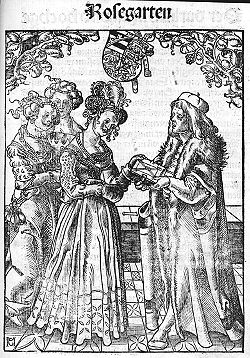This is an old revision of this page, as edited by Ser Amantio di Nicolao (talk | contribs) at 06:58, 9 January 2019 (Copying from Category:16th-century German writers to Category:16th-century male writers using Cat-a-lot). The present address (URL) is a permanent link to this revision, which may differ significantly from the current revision.
Revision as of 06:58, 9 January 2019 by Ser Amantio di Nicolao (talk | contribs) (Copying from Category:16th-century German writers to Category:16th-century male writers using Cat-a-lot)(diff) ← Previous revision | Latest revision (diff) | Newer revision → (diff)
Eucharius Rösslin (Roslin, Rößlin), sometimes known as Eucharius Rhodion, (c. 1470 – 1526) was a German physician who in 1513 authored a book about childbirth called Der Rosengarten (The Rose Garden), which became a standard medical text for midwives.
Midwifery
Rösslin was an apothecary at Freiburg before being elected physician to the city of Frankfurt on Main in 1506. He served as physician to the city of Worms in the service of Katherine, wife of Henry IV, Duke of Brunswick-Lüneburg. While examining and supervising the city's midwives, he found their practice of midwifery to be careless and substandard, leading to high rates of infant mortality. As a result, he wrote his book in German, to make it accessible, and published it in the then-German city of Strasbourg. He included in it engravings by Martin Caldenbach, a pupil of Albrecht Dürer. Thereby Der Rosengarten gave for the first time printed illustrations of the birthing chair, the lying-in chamber, and the positions of the fetus in utero.
Alongside his direct observation of midwifery at Worms, Rösslin incorporated information gleaned from writers of antiquity such as Muscio and Soranus of Ephesus. In the introductory prologue to the text, written in verse, Rosslin emphasizes the importance of the role of men in reproduction and blames midwives who "through neglect and oversight... destroy children far and wide." He threatens midwives with a warning that God will call them to account. "And since no midwife that I've asked / Could tell me anything of her task / I'm left to my medical education."

Success
The book was an immediate success. It then appeared in English in 1540 as The Birth of Mankind. By the mid-16th century, it had been translated into all the main European languages and had gone through numerous editions.
Rösslin returned to his original job in Frankfurt in 1517, where he remained until his death in 1526.
His son, Eucharius Rösslin the Younger, succeeded his father as town physician. He wrote a book on minerals and mineral use, and published a Latin translation of his father's book as De partu Hominis in 1532.
Der Rosengarten
And when the time of labour is come, in the same stoole ought to be put many clothes or crows in the backe of it, the which the midwife may remove from one side to another, according as necessity shall require. The Midwife her selfe shall sit before the labouring woman, and shall diligently observe and waite, how much, and after what meanes the child sitrreth itselfe: also shall with hands, first anoynted with the oyle of almonds or the oyle of those white lillies, rule and direct everything as shall seeme best. Also the midwife must instruct and comfort the party, not only refreshing her with good meate and drinke, but also with sweet words, giving her hope of a good speedie deliverance, encouraging and enstomacking her to patience and tolerance, bidding her to held in her breath as much as she may, also stroking gently with her hands her belly about the Navell, for that helpeth to depress the birth downeward.
Gallery
-
 Presentation (obstetrics) illustration
Presentation (obstetrics) illustration
-
 4th Chapter illustration. A woman giving birth on a birth chair.
4th Chapter illustration. A woman giving birth on a birth chair.
References
- Rösslin, Eucharius, De partu hominis, et quae circa ipsum accidunt Archived 2007-10-06 at the Wayback Machine
- Oxford University Press
- A Brief History of Medicine
- Fetal Neonatal Ed. – Sign In Page